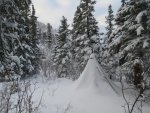I don't know which of the 4 above I come off as but my hunting is done mostly in Sept./Oct @ 7k-10k feet and it's taken me 20 years to get dialed in... I bring in absolutely nothing extra. I don't mean to imply that everyone should do it this way and it's definitely not for everyone because it's pretty spartan but it works for me...
Fwiw- I've dropped around 5# since just last season just with equipment upgrades.
I would say you fall into the #2 category

